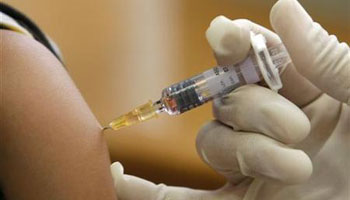
 |
| (Xinhua Photo) |
WASHINGTON, Jan. 22 (Xinhua) -- Egg allergic children, including those with a history of anaphylaxis to egg, can safely receive a single dose of the seasonal influenza vaccine, according to a new study from the University of Michigan.
The new study, published Tuesday in the Annals of Allergy, Asthma and Immunology, is good news for children who've had severe egg allergies, given the prevalence of the flu this season. In the study, none of the children with severe egg allergies developed an allergic reaction after receiving the vaccine, says Matthew Greenhawt, lead author of the study.
"The flu vaccine is grown in embryonated chicken eggs and contains residual amounts of ovalbumin, a major egg allergen. This has historically raised concern about the safety of the vaccine in children with egg allergies," says Greenhawt. "But this study shows these children, all of whom either had anaphylaxis or a severe allergic reaction from egg, can tolerate the vaccine. The benefits outweigh the risks."
Influenza A is responsible for 21,156 annual hospitalizations of children younger than five years. The U.S. CDC reports that influenza activity right now is high and widespread across the nation. Thirty states and New York City were reporting high activity during the week of Jan. 6. As of Jan. 12, the total number of influenza-associated pediatric deaths was 29 for the 2012-13 flu season. As many as one-third of children with a food allergy have asthma, and this group is particularly susceptible to influenza.
Greenhawt says the only precaution needed is that egg-allergic children should be observed for 30 minutes after vaccination in any medical setting, including primary care providers' offices, where an allergic reaction could be recognized and treated should it occur.
Egg allergy is one of the most common food allergies in U.S. children, but by age 16 about 70 percent outgrow the allergy.
















 Beijing style: Duck, opera, fog and cough...
Beijing style: Duck, opera, fog and cough...


![]()
